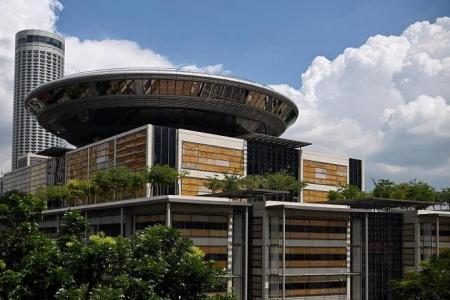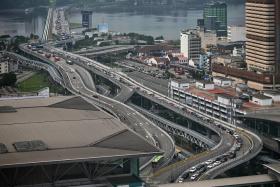Can overseas court hear a civil suit originating in Singapore?
In his first public comments after ministers K. Shanmugam and Vivian Balakrishnan each sent him lawyers’ letters, Mr Lee Hsien Yang said that the two ministers should sue him in a court in Britain, saying he was in the country at the time.
Mr Lee – the younger son of former prime minister Lee Kuan Yew and brother of Prime Minister Lee Hsien Loong – also said in a Facebook post on Saturday that he was stating the facts when he posted his comments on the Ridout saga.
In the earlier post on July 23, Mr Lee claimed the “two ministers have leased state-owned mansions from the agency that one of them controls, felling trees and getting state-sponsored renovations”. The agency he was referring to is the Singapore Land Authority.
Mr Shanmugam, who is Law and Home Affairs Minister, said Mr Lee had accused him and Dr Balakrishnan, who is Foreign Minister, of acting corruptly and for personal gain, and added that the allegations were false.
He said they would sue Mr Lee for defamation if he does not apologise, withdraw his allegations and pay damages, which will be donated to charity.
Lawyers whom The Straits Times spoke to said that while the potential defamation suit can be commenced in Britain, this is unlikely to happen as Singapore may be regarded as the just and convenient forum.
Q: What conditions should be present for the suit to take place in Britain?
A: An applicant has to file an originating claim when commencing legal proceedings in a civil case.
If the respondent of that claim is residing or working outside of Singapore, the applicant has to file what is known as a “service out of jurisdiction”, said Mr Mohamed Fazal Abd Hamid of IRB Law.
The respondent might contest the originating claim by taking the position that another court of competent jurisdiction is a more appropriate venue for the case to be heard.
“In this event, the respondent typically files for a stay application such that another court, for example, in Britain, is a more appropriate venue for the dispute to be heard,” Mr Fazal added.
Lawyer Daniel Goh, managing director of Characterist, said it is technically possible for a suit to commence in Britain, provided it is true that a defamatory publication was indeed published there.
“However, it is possible that the British court’s jurisdiction over the matter may be challenged,” he said.
As there are connecting factors linking the claims to Singapore, it is likely that Singapore may be regarded as the just and convenient forum, said Mr John Lim, managing director of LIMN Law Corporation.
“The possibility that Lee Hsien Yang has apparently relocated to Britain does not necessarily make Britain the just and convenient forum,” he added.
Q: What if the allegations were made from outside Singapore?
A: Even if the alleged defamatory statements have been made outside of Singapore, it does not necessarily mean that the suit must take place in that jurisdiction, said Mr Lim.
“The argument that the alleged defamatory statements were made outside of Singapore is not a strong argument.
“On the contrary, the jurisdiction in which the harm was caused, or where the reputational harm to the ministers takes place, is a strong connecting factor.”
Mr Lim said that in the present case, the alleged defamatory statements were targeted at Singaporeans, and in Singapore, and there are strong connecting factors linking the claims to Singapore.
“Singapore is a natural forum of the potential claims,” he added.
Mr Goh said the issue of which court has jurisdiction over the matter may be contested. “Parties may have to litigate or otherwise reach a conclusion on whether the suit should take place in Singapore or Britain.”
Q: How is the jurisdiction decided, and how will a court decide whether to hear the case?
A: Characterist lawyer Mitchell Leon said the key question is whether there is a sufficient connection between the jurisdiction and the alleged defamatory act.
“There is a wide range of factors which may influence this issue, and some of these might include the place in which the alleged defamatory content was published, and the place where the effects of the defamation would be most strongly felt,” he added.
Mr Lim said other factors include the personal connection of the parties and witnesses, the connections to relevant events, the governing law to the dispute, and the current domicile of the parties, which he added may be of little significance if the dispute concerns parties with a high degree of mobility.
Get The New Paper on your phone with the free TNP app. Download from the Apple App Store or Google Play Store now


